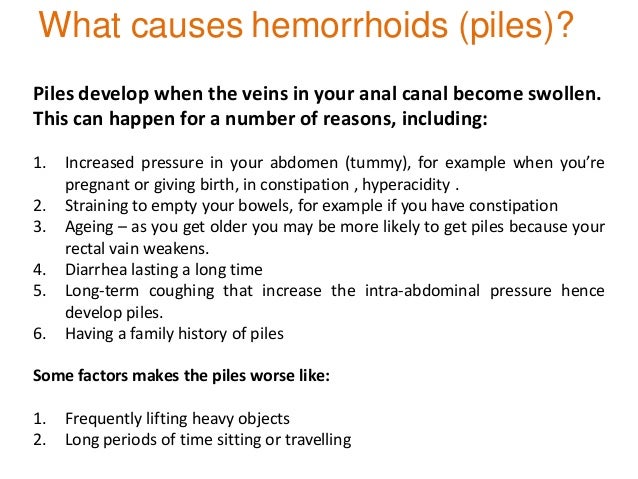There are many theories as to why Hemorrhoids occur. As already stated, pregnant women often suffer from them as the weight of the unborn baby presses on the lower bowels and often causes straining during toilet visits. For the expectant mother this can be just one more indignity along the path of pregnancy.
Straining is a major cause and this is often due to a low fibre diet. The increased pressure caused by straining results in engorgement of the hemorrhoids, perhaps by cutting off the venous return of the blood. People who suffer with constipation also often report hemorrhoids as a complication, but those with very loose bowel movements can also suffer or exacerbate a hemorrhoidal condition.
Prolonged sitting on the toilet, especially amongst those who enjoy a read on the throne can contribute to the condition by a kind of tourniquet effect as the blood circulation is restricted by the weight of the body on the buttocks.
Ageing is another possibility with people in their twenties complaining of the condition. Stress and anxiety can interfere with normal digestion and in turn cause hemorrhoids. The author was 33 when the tragic death of his niece came just days before the first onset of the condition. Since then he has managed the condition with diet and common sense.
Most people will suffer when in their forties and fifties and onwards. As we all age we suffer a weakening of our muscular support structures which make sit easier for hemorrhoids to prolapse, or fall down and out of the anus.
Most persons have suffered from Constipation at one time or other, due to change of diet, travel, surgery, medication, stress or many other simple causes. These are temporary bouts and correct themselves when properly settled in.
Next in line is Constipation which is treatable with laxatives and changes in life style. The causes of this medium-term Constipation include a low-fiber and high-fat diet (dairy products, meats and eggs), not drinking enough liquids, excessive use of dehydrating liquids like coffee, tea, cola and alcohol, lack of exercise, sedentary lifestyle, usage of medications like antacids, antidepressants, antispasmodic drugs, iron tablets, anticonvulsant drugs, painkillers or prolonged medication for some other chronic condition which causes Constipation as a side effect, old age, pregnancy, abuse of laxatives and repeatedly refraining from having a bowel movement when the urge is there (for example, due to continuous travel or in order to avoid using public toilets).
Chronic Constipation is a long-term problem, which can be divided into diseases that directly affect the GI tract and cause the problem, and diseases elsewhere in the body, which cause Constipation. Problems of the GI tract include irritable bowel syndrome (IBS), chronic idopatic intestinal pseudo obstruction, intestinal obstruction (scar tissue, diverticulosis, tumors, colorectal stricture, Hirschsprung's disease and cancer), colonic inertia and delayed transit (the colon muscles do not push the stool with normal strength and the movement of the stool is delayed), anorectal dysfunction (this condition prevents the rectal muscles from relaxing to pass the stool) and structural problems (anal fissures, hemorrhoids, strictures, tumors, rectal prolepses, fistulae, stenosis and rectede).
Most of the above problems need specialized equipment and tests. Disorders with other parts of body which cause Constipation are neurological diseases like multiple sclerosis, Parkinson's disease, stroke and spinal cord injuries, metabolic and endocrine problems like diabetes, uremia, hypercalemia, amyloidosis and scleroderma.



No comments:
Post a Comment